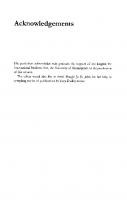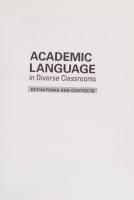Academic writing in contexts: Implications and applications 9781474211734, 9781902459264
This volume explores a number of themes of current interest to those engaged in researching and teaching academic genres
274 112 14MB
English Pages [251] Year 2001
Recommend Papers

- Author / Uploaded
- Martin Hewings (editor)
File loading please wait...
Citation preview
Introduction Ma&i.r He~gings
The papers in this vofume have been collected as a tribute to Tony Dudleyf3vans on his retirement from the University of Birmingham. The authors arc all pcoplc who know Tony well both professiondy and persctnally, having worked with him in various ways in the world of EngIish language teaching, as colleagues, students, or in connection with his editorship of the journal iiitchtio/qg, 21. Oregon. with Smart, T. and Wall, J. NfrcIetts: fitlgijzee~i~,q. Harlow: I x l n p a n . 1980 with Johns, T. An experiment in the team teaching of overseas postgraduate students of Transportation and Plant Biology. In Eutu teachitg it1 IiSl-? fiIdTDocztn~et~ts 106 (pp.6-23). The British Council. with Swales, J. Study modes and srudcnts from the Xfiddle East. in G. M. Greenall and J. E. Price (eds), Siiaj ?Itodes a i d acad~~~iic derralp nlertt of ogerseus stiidetrts. E1,T Documents Special, 1t19. 1981 The RI,U survey on Ngec Ann College graduates' requirements of English. IUiIICjortrt~al,12, 1. with Johns, T. A team-teaching approach to lecture comprehension for overseas students. In Z%!eteachitg af list~frir4qco~~@rrhrrtsiort. 1Q.T Documents Special. 1974
Distanced and refined selves: educational tensions in writing with the power of knowledge We often look on the rise of disciplines and professions with some suspicion as they are rightfully seen as the site of the aggregation of power - power granted by the importance of knowiedge in contemporary society, which is now being regularly designated as an information society (Bazerman forthcoming; Dizard 1982). We now have many historical, sociological and rhetorical accounts of how that power was aggregated and maintained within bounded disciplinary spaces (for example Bazerman 1999; I,att>ur and Woolgar 1979; Shapin 1982, 1994), how institutions of knowledge grew and gained influence (Atkinson 1999; Hall 1984; Jacob 1988; Merton 1973; MorreU and Thackray 1981; Shapin and Schaffer 1985), how decisions became matters for experts (Porter 1995), how authority was constructed for those beyond (Gieryn 1999), how negotiations, cooperations and alliances were created with other powerful disciplines and social actors @,atour 1987; van Nostrand 1997) and how public issues became re-framed to incorporate or exclude various forms of disciplinary and professionat knowledge (Myers 1990; Nelkin 1979,1987; Rudwick 1985). Some of these studies take a highly sceptical view of these powerful formations (Barnes and Shapin 1979; Bijkur ef a/. 1987). Others see that the knowledge developed within disciplines warrants the strong influence disciplines and professions maintain over their own conduct and over other domains which depend on their knowledge (Abbott 1988; Gregory and Miller 1998). And many take the middle grtlund, seeing inappropriately self-interested use of the power of kno~vledge,and the need for decision making to include interests and knowledge that estcnd beyond the bounds of the professions. Consider, for example, the &story of environmental concern - where different sciences (including chemistry, ecology, biology and demography), government regulators, lawyers, corporations, economists, activists and community groups have all taken complex and shifting roles.
The future is with us: preparing diverse students for the challenges of university texts and cultures Ann M. ]ohn.ii n his thought-provoking volume, Writa'fgthe Fa~ttln,:Engiisb and the Makitrq of a Cilltrre of I~novarian(1995), Eunther ICress argues that English educators should be at the forefront of curricular innovation, since the interactions of language, text, and technology are central to our current and future worlds, These are the curricujar principles that he urges us to follow: 1 A curriculum should envisage, project, and aim to produce an individual who is at ease with difference and change, whose fundamental being values lnnovauon and is therefore able to quesuon, to challenge, and above all, to propose alternatives constructively. 2 This curriculum should project and aim to take a central role in producing a society which values humans, accords them real dignity, and aims to provide for all its members the possibility of a quality of life which is at least no worse than that enjoyed by my generation. (p.29)
My purpose in this paper is to honor Tony Dudley-Evans, an outstanding English for Specific Purposes practitioner, by using ECress's ambitious goals to outline my own English teaching situation, which is somewhat parallel to Tony's, to discuss some of the challenges that are posed by attempting to achieve the aims that ICress espouses, and to present our local attempts to develop English language curricula which, in our view, honor difference, encourage innovation, and exploit multimodal literacies.
Descriptions or explanations? Some methodological issues in Contrastive Rhetoric Anna Mazrranen Contrastive Rhetoric (CR) is a typical field in applied linguistics in that it has arisen from practical observation in the context usually taken to be the core of applied linguistics, or even 'linguistics applied': second language teaching. In this way, CR has not had any obvious theoretical foundation, nor has it arisen from a methodologcal problem to be solved. This origin is present in the field even now that it has become quite established - the theorising that there is has arisen from the need to explain the findings, and the research that has been carried out has made use of a number of methods and methodological emphases, none of which is unique to CR. In recent years there have been demands, if not downright for more theory in CR, at least for new types of description which also bring cultural and linguistic aspects into a principled relationstup. The point has been raised by a number of scholars that we need 'ttucker' descriptions of texts in the Geertzian sense (e.g. Huckin 1997; Swales 1998). In the same vein, demands for 'explanation' have been made (e.g. Melander 1996; Scollon 1997) which bear close affinity to the approach to explanation adopted in Critical Discourse Analysis (e.g. Fairclough 1992a, 1995), and also resemble attempts in other disciplines to make sense of cultural comparisons of scientific practice (e.g. Hanvood 1995). In what follows, I shall look into some of these demands and criticisms and assess their value for moving CR onwards, particularly in the context of academic writing.
A case study of Contrastive Rhetoric I,et me start by presenting an example of a study in Contrastive Rhetoric for illustration. This is my own research (hlauranen 1993) concerning rhetorical differences in the academic texts written by Finnish and Anglo-American researchers. I analysed the use of text reflexivity, or metadiscourse, and
From evidence to conclusion: the case of 'indicate that'
In 1991 Tony Dudley-Evans and I decided that it would be good for the souls of those of us in the English for Overseas Students Unit to undertake some joint research into the English of scientific research papers, since this is one of the main genres where we try to help our students. Tony had already organised the sampling and scanning of a corpus of 434,000 words from the high-prestige research journal Natore comprising articles and letters to Nutlrrtt; and we concentrated on examination and analysis of that material. In the event, our weekly Wednesday afternoon meetings were very enjoyable and proved excellent as a way of bonding old and new members of the unit, but somehow we never got round to our original intention of publishing the results of our efforts. As both Tony and I are now taking retirement from the unit (since renamed the English for International Students Unit) this may be an appropriate occasion to rescue, reconsider and expand upon a small piece of work done for one of those Wednesday afternoon sessions ten years ago. As one of my contributions I offered to look at the main verbs followed by that-clauses in the data, with the results presented in Figure 1. (For a more detailed analysis see http://~eb.bham.ac.uk/johnstf/5~verbs.htm). The two most striking features of these results both concern the verb indicate. Firstly, in these data it is in this syntactic context by far the commonest verb. This contrasts sharply with its frequency in other genres of Iinglish: in indicate a comparable corpus of texts from the newspaper the G~arnial~, comes in 65th place among the verbs followed by that-clauses. This striking difference forms a strong prima facie argument that the verb has a special and privileged communicative role in the Natzlre tests. The other striking feature of indicate is in its selection of subjects. The starting-point here is the observation that of these five verbs, only one - find - is in these tests used exclusively with human subjects. Three of the other first five verbs (show, suggest and demonstrate) are in this contest more often used with non-human than with human subjects, their essential
'In my opinion': the place of personal views in undergraduate essays Grtg Myen Twenty years ago, Jack Rawlins summed up a common attitude among teachers of writing in an essay entided What's so wrong with "In my opinion"?' He began: For years, I have methodically crossed out phrases like '1 think', 'I feel', 'I believe' or 'in my opinion' when I encountercd them in my students' writing on literature. \X7hcnever L did, my studenrs' faces would go blank with wonder and they would ask me why. 'Rut it is my opinion,' they would purr. (1980: 670)
1 lcre is an example of what Rawlins is talking about from a linguistics essay in which a student was asked to say why tests should be studied in relation to social practices: In my personal opinion, I find it very difficult to imaginc language.
R
social practice \vithout
Why is this odd? Rawlins and others would say that the student's opinion hardly matters here; what is at issue in this exam is the ability to prowide evidence to support one view or the other, thus showing one understands rhe concepts. How could a student get to the end of the first year without understanding this distinction berwecn what is a matter of opinion and what is not? My argument in t h s paper is that the effect of declaring a statement to be an opinion is not that simple. First, the boundary between what is a matter of opinion and what is not, which seems so clear to us when we are marking exam scripts or drawing up course descriptions, is complex and open to neg11tiation in any particular case. Second, a marker such as 'in my opinion' or 'in my personal view' is no guide to this boundary; these markers are used for
Analysing genre: some conce~tualissues Vihy K Bhatia Overview Genre analysis continues to provide an attractive framework for the analysis of language use for a variety of applied Linguistic purposes, particularly for the teaching and learning of English for academic and professional purposes. Although recent research (see Bargela-Chiappini and Nickerson 1999; Bhatia 1998,1999a, 1999b, 2000,2001 ; Candlin and Hyland 1999; Candlin and Plum 1999; Fairclough 1993,1995; Hyland 2000; Sarangi and Candlin 2001; Swales 1998, to name only a few) provides a significant and desirable extension of interest in the direction of multifaceted, multidimensional and ethnographically grounded thicker descriptions of genres, rhetorical move analysis continues to provide insightful information for pedagogic practice. Iiowevcr, it is becoming increasingly clear that, for a consistent and systematic analysis of cognitive and rhetorical structuring in genres, it is necessary to refine and adequately specify the nature, function and distribution of a number of methodological concepts like the rhetorical move and strat








![Phraseology in English Academic Writing: Some implications for language learning and dictionary making [Reprint 2013 ed.]
9783110937923, 9783484309753](https://ebin.pub/img/200x200/phraseology-in-english-academic-writing-some-implications-for-language-learning-and-dictionary-making-reprint-2013nbsped-9783110937923-9783484309753.jpg)
